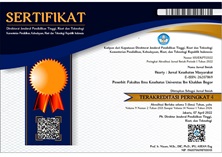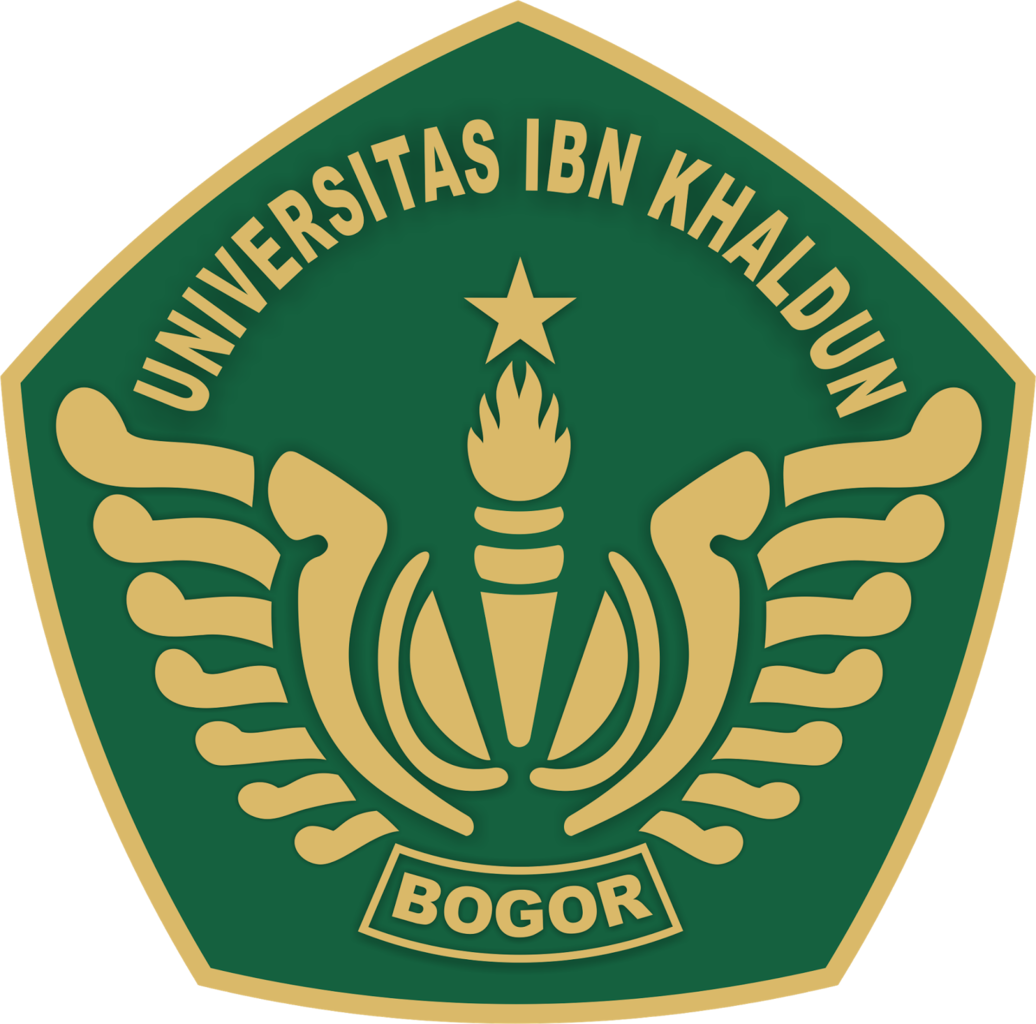Tentang Jurnal Ini
Focus and Scope
Hearty Journal : Journal of public health is a scientific journal published by the Faculty of Health Sciences, Univ. Ibn Khaldun Bogor with the following scope:
- Epidemiology
- Maternal and Child Health
- Community Nutrition
- Health Promotion
- Health Service Management
- Occupational Safety Health
- Environmental Health
- Biostatistics
Peer Review Process
The review policy by Hearty: A journal of public health is as follows:
- Each paper submitted will be reviewed by two reviewers.
- The review process uses Double-blind Review, in which the reviewer does not know the identity of the author, and vice versa the author does not know the identity of the reviewer.
- In the review process, reviewers consider the correspondence of the title, abstract, discussion (findings) and conclusion. In addition, reviewers also consider novelty, scientific impact, and references used in the paper.
Responses from bestary partners will be taken into consideration for the Editor to decide:
- Accept submissions
- Revision required
- Resubmit for review
- Resubmit elsewhere
- Reject submission
An article is rejected for publication due to various considerations, including:
- The article does not fit the scope of the journal.
- The article does not follow scientific writing rules or guidelines.
- Fundamental methodological errors.
- The author refuses to make improvements to the suggestions given by the bestary partner without logical basis.
- There are indications of plagiarism of more than 30%.
Publication Frequency
HEARTY is published twice a year, in February and August.
Open Access Policy
This journal provides immediate open access to its content on the principle that making research freely available to the public supports a greater global exchange of knowledge.
Plagiarism Check
Manuscripts submitted to the editors of Hearty: Journal of Public Health are recommended to be screened using turnitin.com
Reference Management
Manuscripts submitted to the editors of Hearty: Journal of Public Health is encouraged to use reference management mendeley.com
Open Acces Policy
This journal is open access journal which means that all content is freely available without charge to users or / institution. Users are allowed to read, download, copy, distribute, print, search, or link to full text articles in this journal without asking prior permission from the publisher or author. This is in accordance with Budapest Open Access Initiative.
BUDAPEST OPEN ACCESS INITIATIVE
For various reasons, this kind of free and unrestricted online availability, which we will call open access, has so far been limited to small portions of the journal literature. But even in these limited collections, many different initiatives have shown that open access is economically feasible, that it gives readers extraordinary power to find and make use of relevant literature, and that it gives authors and their works vast and measurable new visibility, readership, and impact. To secure these benefits for all, we call on all interested institutions and individuals to help open up access to the rest of this literature and remove the barriers, especially the price barriers, that stand in the way. The more who join the effort to advance this cause, the sooner we will all enjoy the benefits of open access.
The literature that should be freely accessible online is that which scholars give to the world without expectation of payment. Primarily, this category encompasses their peer-reviewed journal articles, but it also includes any unreviewed preprints that they might wish to put online for comment or to alert colleagues to important research findings. There are many degrees and kinds of wider and easier access to this literature. By "open access" to this literature, we mean its free availability on the public internet, permitting any users to read, download, copy, distribute, print, search, or link to the full texts of these articles, crawl them for indexing, pass them as data to software, or use them for any other lawful purpose, without financial, legal, or technical barriers other than those inseparable from gaining access to the internet itself. The only constraint on reproduction and distribution, and the only role for copyright in this domain, should be to give authors control over the integrity of their work and the right to be properly acknowledged and cited.
While the peer-reviewed journal literature should be accessible online without cost to readers, it is not costless to produce. However, experiments show that the overall costs of providing open access to this literature are far lower than the costs of traditional forms of dissemination. With such an opportunity to save money and expand the scope of dissemination at the same time, there is today a strong incentive for professional associations, universities, libraries, foundations, and others to embrace open access as a means of advancing their missions. Achieving open access will require new cost recovery models and financing mechanisms, but the significantly lower overall cost of dissemination is a reason to be confident that the goal is attainable and not merely preferable or utopian.
To achieve open access to scholarly journal literature, we recommend two complementary strategies.
I. Self-Archiving: First, scholars need the tools and assistance to deposit their refereed journal articles in open electronic archives, a practice commonly called, self-archiving. When these archives conform to standards created by the Open Archives Initiative, then search engines and other tools can treat the separate archives as one. Users then need not know which archives exist or where they are located in order to find and make use of their contents.
II. Open-access Journals: Second, scholars need the means to launch a new generation of journals committed to open access, and to help existing journals that elect to make the transition to open access. Because journal articles should be disseminated as widely as possible, these new journals will no longer invoke copyright to restrict access to and use of the material they publish. Instead they will use copyright and other tools to ensure permanent open access to all the articles they publish. Because price is a barrier to access, these new journals will not charge subscription or access fees, and will turn to other methods for covering their expenses. There are many alternative sources of funds for this purpose, including the foundations and governments that fund research, the universities and laboratories that employ researchers, endowments set up by discipline or institution, friends of the cause of open access, profits from the sale of add-ons to the basic texts, funds freed up by the demise or cancellation of journals charging traditional subscription or access fees, or even contributions from the researchers themselves. There is no need to favor one of these solutions over the others for all disciplines or nations, and no need to stop looking for other, creative alternatives.
Open access to peer-reviewed journal literature is the goal. Self-archiving (I.) and a new generation of open-access journals (II.) are the ways to attain this goal. They are not only direct and effective means to this end, they are within the reach of scholars themselves, immediately, and need not wait on changes brought about by markets or legislation. While we endorse the two strategies just outlined, we also encourage experimentation with further ways to make the transition from the present methods of dissemination to open access. Flexibility, experimentation, and adaptation to local circumstances are the best ways to assure that progress in diverse settings will be rapid, secure, and long-lived.
The Open Society Institute, the foundation network founded by philanthropist George Soros, is committed to providing initial help and funding to realize this goal. It will use its resources and influence to extend and promote institutional self-archiving, to launch new open-access journals, and to help an open-access journal system become economically self-sustaining. While the Open Society Institute's commitment and resources are substantial, this initiative is very much in need of other organizations to lend their effort and resources.
We invite governments, universities, libraries, journal editors, publishers, foundations, learned societies, professional associations, and individual scholars who share our vision to join us in the task of removing the barriers to open access and building a future in which research and education in every part of the world are that much more free to flourish.
February 14, 2002
Budapest, Hungary
Leslie Chan: Bioline International
Darius Cuplinskas: Director, Information Program, Open Society Institute
Michael Eisen: Public Library of Science
Fred Friend: Director Scholarly Communication, University College London
Yana Genova: Next Page Foundation
Jean-Claude Guédon: University of Montreal
Melissa Hagemann: Program Officer, Information Program, Open Society Institute
Stevan Harnad: Professor of Cognitive Science, University of Southampton, Universite du Quebec a Montreal
Rick Johnson: Director, Scholarly Publishing and Academic Resources Coalition (SPARC)
Rima Kupryte: Open Society Institute
Manfredi La Manna: Electronic Society for Social Scientists
István Rév: Open Society Institute, Open Society Archives
Monika Segbert: eIFL Project consultant
Sidnei de Souza: Informatics Director at CRIA, Bioline International
Peter Suber: Professor of Philosophy, Earlham College & The Free Online Scholarship Newsletter
Jan Velterop: Publisher, BioMed Central
Publication Ethics
It is necessary to agree on common ethical standards that are expected for all parties involved in the publishing process: authors, journal editors, reviewers and publishers.
Fairness. An editor must always evaluate the author's manuscript in terms of scientific content without any racial, ethnic or political affiliations or views of the author.
Confidentiality. The editor and any editorial staff must not disclose any information from the submitted manuscript to anyone other than the author, reviewers, editorial board, and other publishers on a reasonable basis.
Publication and Conflict of interest. Unpublished material included in the manuscript may not be used for the editor's own research without the written consent of the author. Privileged ideas or information obtained through review should be kept confidential and not used for personal gain. Reviewers should not review manuscripts in which they have a conflict of interest due to a competitive, collaborative, or other relationship with any author, company, or institutional party associated with the article.
Speed. Any reviewer who feels incompetent to review the manuscript or feels unable to review the manuscript within the specified time should inform the reason and withdraw from the review process.
Confidentiality. Accepted manuscripts should be treated confidentially. Manuscripts should not be shown or discussed with others except those authorized by the editor.
Objectivity Standard. Reviews should be conducted objectively and not criticize the author's personality. Reviewers should express their views clearly with supporting arguments.
Source Statement. Reviewers should identify relevant published works that have not been cited by the authors. Any statements in the form of observations, or arguments that have been previously published must be accompanied by relevant citations. Reviewers are also required to alert the editors to manuscripts that indicate plagiarism.
Reporting Standards. Each Author of a research report should present an accurate account of the work performed as well as an objective discussion of its significance. The underlying data must be accurately represented in the manuscript. The manuscript should contain sufficient detail and references to permit others to replicate the work. False or inaccurate statements are unethical and unacceptable behavior.
Data Access and Storage. Authors are requested to provide raw data in relation to papers for editorial review, and should be prepared to provide public access to such data (in accordance with the ALPSP-STM Statement on Data and Databases), where practicable, and in any event be able to retain such data for a reasonable time after publication.























